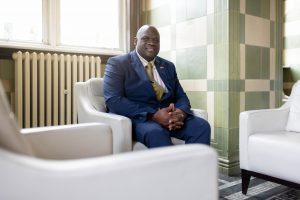Moses was born in Uganda, and came to the UK aged 15. He qualified with a degree in Psychology and, later, a Master’s degree in Public Health & Addiction at Kings College London . His Trust had a partnership with Butabika Hospital, the large National Referral Hospital for mental health in Kampala, Uganda. Three years after qualifying, in 2009, Moses was recruited to join the partnership to visit there as a clinician. His first visit was for three months, and he has since been out for shorter visits of two weeks to a month.
“I’d never been to a clinical setting within Uganda, so I was thinking: what can I learn from that area if I went out, and what can I teach – what can other colleagues learn from me?”
Being from Uganda originally, Moses felt he had some knowledge of how mental health issues were experienced in Ugandan communities, for example the stigma of mental illness. Moses wanted to understand more about how people experience mental health services in Uganda, and how that affects their experiences when they come to the UK as a diaspora. Therefore, he hoped to learn from the global health opportunity, and use this to help others, by bringing a greater understanding of Ugandan cultural appropriateness back to his Trust in London. So while he was in there, Moses observed treatments and provided some stress reduction sessions for the nurses there.
Moses thought he was prepared before his visit, being from Uganda, and following the Trust pre-travel advice about safety, but he admits it was quite a shock going there:
“I knew the context of Uganda. I knew the language. Being put on the clinical wards for me was quite shocking with about one nurse per 20 patients.”

The wards were very crowded with patients with a range of different needs. Moses was impressed by the resilience of the nurses in that setting. Discussing his experience with the clinical teams there, Moses was able to share some of his skills and expertise, but he also recognised some differences and challenges in the UK system. For example, the nurses there picked up patients’ names much faster than Moses had experienced in the UK. He observed the local nurses engaging with people and saw patient-led recovery colleges in action.
“Those are things which challenged me to see a human being rather than a mental health patient as well. Looking at someone from a different perspective.”
Moses admits he went there thinking he could change the system and advocate for better services, but seeing the work in the resource-limited setting gave him a different perspective, for example realising what we make take for granted in the UK, such as availability of medications.
On return to the UK, initially Moses questioned whether he had wasted the three months. But gradually he realised he felt more resilient, for example remembering the tougher nurse-patient ratios. He also had developed more understanding of the context of what was happening to the patients. “I was also better in writing my care plans and thinking about the patient in a holistic way clinically. But also as a person I grew up, I thought a bit more like a leader within the team.”
East London has a large Ugandan community, and so this experience enabled Moses to engage more with the community, for example running mental health awareness months and speaking on the radio. Moses works with the East London Global Health link, having developed links with the Ministry of Health in Uganda, to strengthen mental health services including contributing to updating the Ugandan Mental Health Act. Moses now works with Health Education England and the Uganda Health Alliance, which brings together UK partners working in Uganda. He remains passionate about mental health, so ensures volunteers going out are culturally prepared. He continues to link with the Ministry of Health too.
Moses admits he assumed his career would remain clinically focused, but sees the impact he has advocating for services in an interconnected world:
“The world is very small now. I think that experience opened me up to this new world. And now I understand how actually you can improve people’s health through global health. I’ve seen services change. I’ve seen people advocating. There are increased activities around global health because of the Uganda Health alliance, the Ministry of Health are setting their priorities, and partners are coming in and impacting those small changes which will improve the system. So that’s the vision of a system wide approach.”
For people considering a global health opportunity, Moses suggests people are clear about what they hope to learn from the experience.
“Be ready to learn from the staff who are very experienced and knowledgeable. It might be stressful seeing practices that you do not see in the UK, or because of the pressures on the services in low-resource settings.”

“Yet it was empowering and you see a different humanity there. Speaking to someone who has been there would be helpful, along with understanding the area. So leave space for learning.”